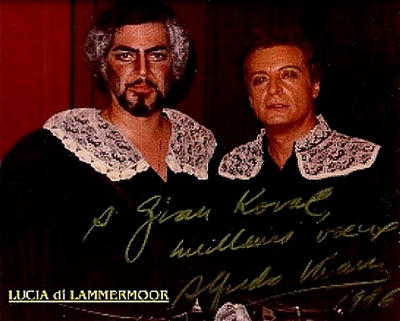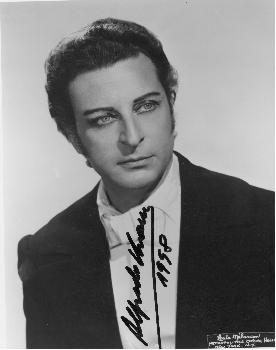Alfredo Kraus
His official debut was in Cairo in January 1956, so after the coaching by Llopart; in reality, however, he already appeared in public in 1954 in
Las Palmas – some say in zarzuela, but it was more probably in concert only. There is even a 1954 live recording of Kraus, from a concert
at the Teatro Pérez Galdos in Las Palmas in December.
Most singers continue to excel in the very first roles that they once upon a time added to their repertory. Kraus, not so. His first operatic
roles were Duca, Cavaradossi and Alfredo; while Cavaradossi was of course completely out of question for his voice (the Cairo theater management
forced him into singing it, very explicitly against his will, and he sang it barely a few times), he returned to Duca and Alfredo very often
throughout his career, and was always completely off in those two characters. His style was so deeply un-Verdian that Verdi wouldn't probably have
recognized his own music as sung by Kraus... What he was great in was belcanto, and French opera; this was the music that opened him the world's
most renowned theaters: La Scala, Metropolitan Opera (134 performances from 1966 to 1996), Covent Garden, Civic Opera Chicago, Vienna Staatsoper,
Teatro Colón in Buenos Aires, Bellas Artes in Mexico City, Liceu in Barcelona, Deutsche Oper Berlin, Salzburg Festival, Paris Opéra,
Opéra-Comique and Opéra Bastille. He also sang a lot in Dallas, he appeared in Rome, Venice, Naples, Parma, Zürich, Lisbon,
Monte Carlo... and regularly in Madrid (Teatro de la Zarzuela, where he would only sing opera, though, with the single exception of Doña
Francisquita), Sevilla, Oviedo or Bilbao. That he sang almost no zarzuela on stage is interesting, because in the recording studio, he did
lots and lots of zarzuelas.
He was always very careful with his voice; he strictly reduced the number of his performances to what he thought was good for his instrument, and
when he tried himself as Rodolfo, he gave up the role immediately, saying that the Bohème orchestra was too thick for his voice.
(And of course, all those Pagliacci and Aida and Trovatore arias were just jokes in concert or on record; he would never have dreamt of trying
anything like that on stage.) His career was accordingly long: he sang his last complete opera (Werther) in July 1998 in Berlin and his last
concert in March 1999 in Las Palmas, and he was still in command of his voice.
He was fantastic in terms of musical style, as far as (I repeat) belcanto and the French repertory were concerned (or zarzuela, as well);
his coloratura, acuti and piano were peerless, and he could fill any theater with ease, although his voice was in fact very small, with his
excellent emission. What his technique was not focused on was beauty of tone; and while I almost always (except for his Alfredo, that is) greatly
enjoyed hearing him in the theater, where his harsh and sharp sounds were softened by the acoustics of a large hall, I find his recordings (never
mind whether studio or live) quite often less than ingratiating.
Rigoletto – al-Qāhira (Cairo), Khedivial Opera House, 17 January 1956 Reference 1: Giovanni Vitale Alfredo Kraus, Bologna 1992 Reference 2: Nino Dentici Burgoa Alfredo Kraus. El arte de un maestro, Bilbao 1992 Reference 3: Fundación Internacional Alfredo Kraus Reference 4 Reference 5 Reference 6: Kutsch & Riemens I wish to thank Gian Koral and Hélia T'Hézan for the picture (top). I would like to thank Thomas Silverbörg for the recordings (Marina, Los claveles, Don Pasquale). |

